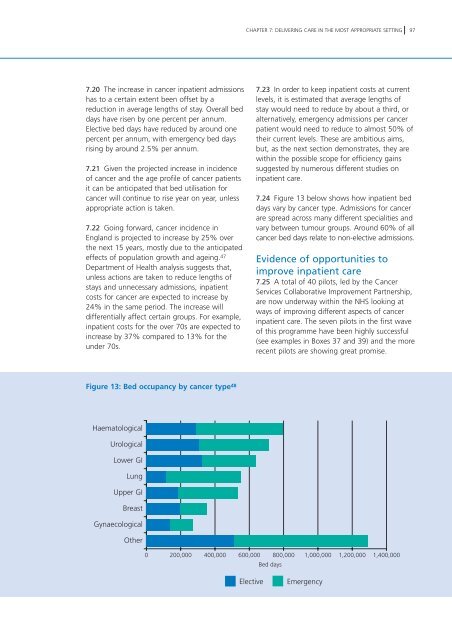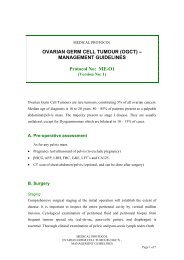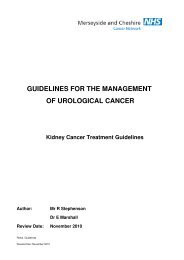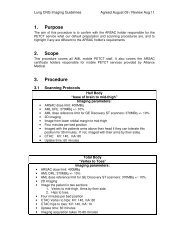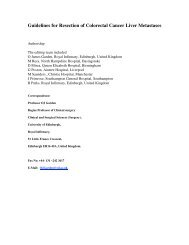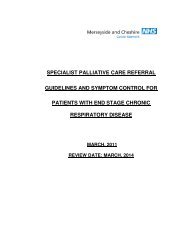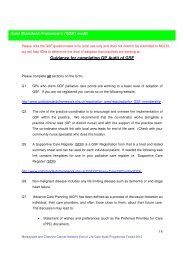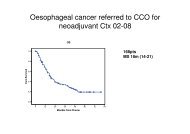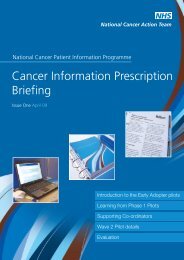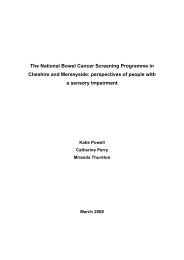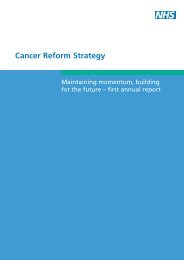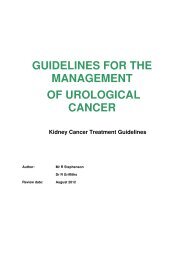Cancer Reform Strategy - NHS Cancer Screening Programmes
Cancer Reform Strategy - NHS Cancer Screening Programmes
Cancer Reform Strategy - NHS Cancer Screening Programmes
- No tags were found...
Create successful ePaper yourself
Turn your PDF publications into a flip-book with our unique Google optimized e-Paper software.
CHAPTER 7: DELIVERING CARE IN THE MOST APPROPRIATE SETTING 977.20 The increase in cancer inpatient admissionshas to a certain extent been offset by areduction in average lengths of stay. Overall beddays have risen by one percent per annum.Elective bed days have reduced by around onepercent per annum, with emergency bed daysrising by around 2.5% per annum.7.21 Given the projected increase in incidenceof cancer and the age profile of cancer patientsit can be anticipated that bed utilisation forcancer will continue to rise year on year, unlessappropriate action is taken.7.22 Going forward, cancer incidence inEngland is projected to increase by 25% overthe next 15 years, mostly due to the anticipatedeffects of population growth and ageing. 47Department of Health analysis suggests that,unless actions are taken to reduce lengths ofstays and unnecessary admissions, inpatientcosts for cancer are expected to increase by24% in the same period. The increase willdifferentially affect certain groups. For example,inpatient costs for the over 70s are expected toincrease by 37% compared to 13% for theunder 70s.7.23 In order to keep inpatient costs at currentlevels, it is estimated that average lengths ofstay would need to reduce by about a third, oralternatively, emergency admissions per cancerpatient would need to reduce to almost 50% oftheir current levels. These are ambitious aims,but, as the next section demonstrates, they arewithin the possible scope for efficiency gainssuggested by numerous different studies oninpatient care.7.24 Figure 13 below shows how inpatient beddays vary by cancer type. Admissions for cancerare spread across many different specialities andvary between tumour groups. Around 60% of allcancer bed days relate to non-elective admissions.Evidence of opportunities toimprove inpatient care7.25 A total of 40 pilots, led by the <strong>Cancer</strong>Services Collaborative Improvement Partnership,are now underway within the <strong>NHS</strong> looking atways of improving different aspects of cancerinpatient care. The seven pilots in the first waveof this programme have been highly successful(see examples in Boxes 37 and 39) and the morerecent pilots are showing great promise.Figure 13: Bed occupancy by cancer type 48HaematologicalUrologicalLower GILungUpper GIBreastGynaecologicalOther0 200,000 400,000 600,000 800,000 1,000,000 1,200,000 1,400,000Bed daysElectiveEmergency


